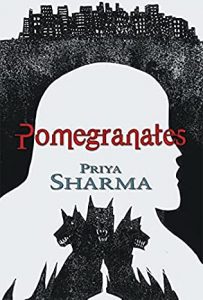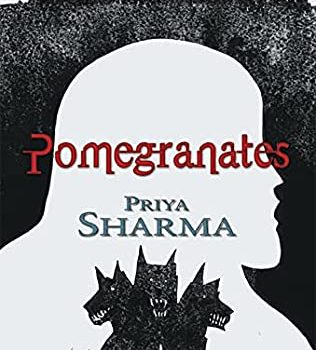Archita Mittra Reviews Pomegranates by Priya Sharma
 Pomegranates, Priya Sharma (Absinthe Books 978-1-78636-875-1, £24.00, 108pp, hc) December 2022. Cover by Jeffrey Alan Love.
Pomegranates, Priya Sharma (Absinthe Books 978-1-78636-875-1, £24.00, 108pp, hc) December 2022. Cover by Jeffrey Alan Love.
Priya Sharma’s latest novella, Pomegranates, is a lovely, layered, and luscious retelling of the story of Persephone and Demeter, unfolding against the backdrop of climate change and patriarchal violence. While Greek mythology has been in vogue at least since the success of Rick Riordan’s bestselling Percy Jackson books, Sharma’s novella sits closer to books like Margaret Atwood’s The Penelopiad, Madeline Miller’s Circe, or Natsuo Kirino’s The Goddess Chronicle, all of which employ a detached, feminine voice in rewriting myth and registering tragedy.
Pomegranates has a lilting, poetic cadence to it, and is suffused with a few moments of quiet horror. These are tricks that we previously glimpsed in Sharma’s short story collection All the Fabulous Beasts, in which she wove darkly evocative stories through small vignettes. Incidentally, All the Fabulous Beasts contains the tale ‘‘Pearls’’, a charming retelling of the story of Medusa and Poseidon that unfolds over the centuries and up to the modern age. Vignettes also provide the structure for Sharma’s novella Ormeshadow, a quiet coming-of-age tale set in the English countryside that gently creeps up on you like a sleeping dragon. Pomegranates is perhaps her most accomplished work yet, focusing on the intertwining stories of three women – Dr. A. Ursa (who is possibly related to Hecate, the Moon Goddess); Demeter, the Corn Mother; and Persephone, queen of the Underworld.
The tale begins with a speech by Dr. Ursa at the Swedish University of Agricultural Sciences, where she urges the audience to build a viable seedbank, foregrounding the novella’s ecological themes. This is followed by a clinical record from the August Institute; we infer that Demeter had been wandering the Earth in search of her daughter and is presently under psychiatric care. There is a nice jab here at the Greek pantheon, which is succinctly described as an ‘‘important family’’ of ‘‘sociopathic rapists, despots, egomaniacs and drunkards.’’ We also learn that Hades has died and Persephone rules instead, full of rage and bitterness but ready to narrate her tale to Ursa, who has stumbled into the underworld after traversing an apocalyptic, tundra-like landscape. Meanwhile, Demeter too slowly opens up to her therapist about the violence of the Gods and her subsequent bargain with Hades to protect her daughter from the machinations of Zeus. Thus, in Sharma’s spin on the legend, Persephone is neither seized by Hades to be his wife and nor does she leave of her own volition (as seen in several contemporary retellings).
At its heart, Pomegranates is a story about women wanting to be heard, whose voices have been effaced or distorted through time. It is not surprising, then, that much of Persephone’s narration to Ursa feels as though she is talking to the reader herself. In another particularly powerful moment, Demeter talks to a lawyer about pressing rape charges against Zeus and Poseidon – it is a clever scene that recounts the details of the violence, not as it happened nor in court, but in a series of back-and-forths between lawyer and client that tells the readers all they need to know about the incident and offers a rundown of the ways patriarchy will strategize to discredit a woman’s narrative. There is also deep anger and revenge here – Demeter curses the trespassing and lascivious King Erysichthon to remain eternally hungry, and Persephone, in her mourning, dooms the planet to a nuclear winter (even COVID-19 is part of her vengeance upon mankind, another nice touch) – and it is these scenes, narrated with so little embellishment, that are bound to linger in the reader’s minds long after the book is closed. In the tradition of ancient Greek plays, a chorus appears between sections, inviting the reader to pause and fill in the gaps, rethink their understandings of history, myth and knowledge, and examine the themes of godliness and humanity, power and agency more closely.
While a part of me wishes that there was more to this world and for the tale to go on, another part of me is astounded by Sharma’s ability to hint at so much with so few words. Deliciously evocative, carefully constructed, and filled with just enough detail to keep the reader turning the pages, Pomegranates is a book which can be finished in a single sitting, but deserves to be savored more slowly. It will appeal not only to fans of feminist retellings of myths and folklore, but to anyone on the lookout for a quiet and beautiful novella.
Archita Mittra is a writer and artist, with a fondness for dark and fantastical things She completed her B.A (2018) and M.A (2020) in English Literature from Jadavpur University and a Diploma in Multimedia and Animation from St. Xavier’s College.
When she isn’t writing speculative fiction or drawing fanart, she can be found playing indie games, making jewelry out of recycled material, reading a dark fantasy novel, baking cakes, or deciding which new Tarot deck to buy.
She lives in Kolkata, India, with her family and rabbits.
This review and more like it in the March 2023 issue of Locus.
 While you are here, please take a moment to support Locus with a one-time or recurring donation. We rely on reader donations to keep the magazine and site going, and would like to keep the site paywall free, but WE NEED YOUR FINANCIAL SUPPORT to continue quality coverage of the science fiction and fantasy field.
While you are here, please take a moment to support Locus with a one-time or recurring donation. We rely on reader donations to keep the magazine and site going, and would like to keep the site paywall free, but WE NEED YOUR FINANCIAL SUPPORT to continue quality coverage of the science fiction and fantasy field.
©Locus Magazine. Copyrighted material may not be republished without permission of LSFF.








